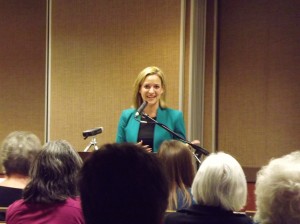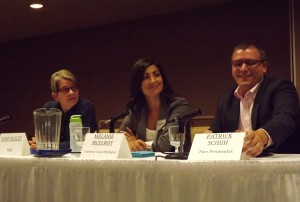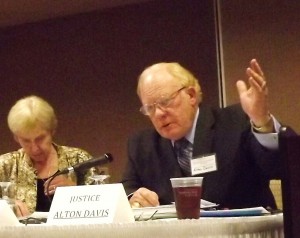As I wrote about last month, the Michigan Campaign Finance Network, Michigan Center for Election Law, and Common Cause Michigan held a conference on election and campaign finance reform in Traverse City last Friday. Although I was unable to attend, my good friend and blogging pal Amy Kerr Hardin was there and put together a comprehensive report. At the request of the conference organizers and with Amy’s permission, I am cross-posting her piece here.
You can find more of Amy’s writing at her site Democracy Tree
Enjoy.
 Michigan Campaign Finance Reform –Something Old, Something New
Michigan Campaign Finance Reform –Something Old, Something New
The statewide Michigan Election Reform Conference of 2013 was held last Friday in Traverse City with about 100 attendees and 16 distinguished speakers, including former Michigan Supreme Court Justices, state lawmakers, union and advocacy group leaders, and various experts in their field. This was a first of its kind, non-partisan event, with the goal of mitigating the role of money in Michigan politics. It was sponsored by Common Cause, the Michigan Campaign Finance Network, Michigan Center for Election Law, and the law firm Thompson-O’Neil.
Some Old News Bears Repeating (A Primer)
The day-long event opened with Northern Michigan Attorney Dan O’Neil, a key sponsor of the conference, making a compelling case that all public policy concerns and regressive trends point back to campaign finance corruption. His argument was that we will never effectively solve the multitude of problems we face as a nation, and in Michigan, without rooting-out the primary vehicle of the elitist power-brokers — dark money in politics.
Rich Robinson, Executive Director of the watchdog organization Michigan Campaign Finance Network, got the ball rolling as he laid-out some shocking numbers with a certain sardonic wit that was much needed levity to combat the sheer weight of his presentation on the post-Citizens United third-party assault on the democratic process. His report, A Citizen’s Guide to Michigan Campaign Finance, Descending into Dark Money, is chock-full of scandalous statistics.
Robinson described the shadowy third-party issue ads as corrosive in numerous ways. They are a clever means to skirt Federal Election Commission law because of their coy language — they don’t directly ask the viewer/listener to vote for a particular candidate or in a specific way on a proposal. Issue ads are governed under a different set of rules than direct candidate ads, with less transparency in donor reporting requirements, thus facilitating a means for corporate interests to create a vast shell game of various organizations to move money in untraceable ways to candidates and causes with no accountability as to the forces behind them.
This we knew.
I won’t attempt to “shock” you with the numbers (you can find them in Robinson’s report.) The names of the culprits are well-known and reviled, with the vast sums similarly widely speculated on. It’s clear they won’t be happy until they have every picnic basket in Jellystone Park. Rep. Jeff Irwin (D-53), a panelist at the event, described his experience as new member in the Michigan House after the 2010 “blood bath” election when far-right control of both houses made Democratic lawmakers irrelevant. He said the new GOP leadership was “interested in one thing, and one thing only — to change our tax policy fundamentally to benefit the wealthy.”
A grim truth.
 Proposed Solutions and New Ideas
Proposed Solutions and New Ideas
Several solutions have long been in the hopper and circulating the internet among concerned citizens — well-known to most. The conference speakers and attendees tossed these ideas around along with some new thoughts.
Jocelyn Benson, Dean of the Wayne State University Law School, describes herself as “constantly hopeful” that we will eventually bring the necessary reforms because “at the end of the day, money can’t vote. People can.”
Benson, the consummate educator, clearly spelled-out the history of campaign finance law and how we came to be where we are today. She put forth three critical reforms, each as important as the other, saying “We need all of these things.”
- Full disclosure of political donations and spending.
- Improved public financing of elections.
- A constitutional amendment.
These same points were echoed by nearly every speaker, yet there are minor variations in some of their interpretations.
On the surface, full disclosure seems like a no-brainer, yet there are very real concerns about some serious inequities that could erupt from a poorly planned implementation. The labor panel, which had leaders from the United Auto Workers, Michigan Education Association and the Michigan Laborer’s Union, repeatedly emphasized that it is important the public not conflate them with the big business types that have been buying our elections since Citizens United. They explained that the political money they raise is literally “nickels and dimes” by comparison. Unions take in less money altogether, mostly through many, many small donations from their thousands of members, whereas corporate PACs may have only a few large donors.
Why does this matter? Reformers have been pushing for same-day reporting of all political contributions regardless of size. Doug Pratt, of the MEA, said that their filings with the Secretary of State are absolutely enormous, already a nightmare for the computer system, with thousands of reports of contributions under ten dollars apiece, and each entry requiring a name, address and date.
Clearly a more equitable system would set dollar thresholds so that a thousand $10 contributions would not be treated the same as one of $10,000.
The second reform initiative is public financing of elections. A legitimate question is “Why do we need the full disclosure if we have public financing?” Ian Vandewalker of the Brennan Center for Justice explained that roughly half the states already have some form of full or partial public financing, including Michigan, which has a combination of both. These voluntary programs are just not resonating with candidates, except for in a couple of isolated places where they actually provide enough money for participants to become viable.
He described the success of a program in New York City where nine out of ten candidates take the public finance route — and they win. NYC passed a comprehensive public finance law with caps on total spending back in 1988 in the wake of a massive corruption scandal. Vandewalker said “politicians in handcuffs” are a great way to move the electorate to support reforms. Under the city’s new law, which gives a 6 to 1 matching grant to candidates, they are electing officials that never would have even considered running under the old system. These new leaders now align with the demographics of their district.
Vandewalker cautioned that even with this, “you’ll never stop rich people from spending money in elections.”, reflecting a point Robinson had made earlier, that “people don’t write 5, 6 and 7-figure checks and not expect something.”
Which brings us the third reform: a constitutional amendment. While this was not extensively discussed, Benson touched on the option, explaining there are currently three such initiatives making the rounds, each with differing language. Her preference was for the most direct wording which uncouples corporate money from politics. Under time constraints for each speaker, she did not elaborate on her reasoning. However, there are many who feel it is folly to entangle the broader historic definition of “corporate personhood” with the issue of corporate political spending. The history of corporate personhood is deeply rooted in the principle of holding corporations liable and responsible for their actions as we do individuals. Meaning, they can be sued for wrongdoing and regulated by law. A poorly worded amendment could become an invitation for more corporate chicanery.
 Dark Money in Judicial Races
Dark Money in Judicial Races
Michigan faces a particularly challenging problem with corporate money buying up its judiciary, race-by-race. In 2010 and 2012, Michigan Supreme Court contests were the most expensive in the nation. Robinson explained that “it’s easier to count to 4 than 76″, referring to the majority needed to influence the high court versus congress. He argued that issue ads should not be permitted in judicial races because they typically call for the voters to contact the candidate or incumbent and demand some type of action, but “judges are not lobbyable officials.”
The judicial discussion panel consisted of two former justices, Elizabeth Weaver and her successor, Alton Davis. They were of like mind on the issue of dark money and the courts.
Davis, who served briefly when appointed under Gov. Granholm after Weaver stepped-down, described his horror at the campaign process. He lost, in spite of the dizzying $6 million spent on his campaign. He lamented of the court: “It’s corrupted by money. It’s absolutely corrupted by money.”
Weaver recently published a hefty book on that very topic, titled Judicial Deceit: Tyranny and Unnecessary Secrecy at the Michigan Supreme Court. She lays out a seven point plan for cleaning-up Michigan’s high court, listed here, briefly:
- End political party nominations.
- Set a 14-year term limit, and eliminate age-cap of 70.
- Establish a qualifications committee to recommend appointments for vacancies.
- Require full transparency in campaign financing.
- Provide public funding for campaigns.
- Rotate terms so there’s an election for one seat every two years.
- Require transparency in judicial business.
The retired justice spoke passionately about her commitment to reforming the court. Weaver and Davis are joined in the fight by another former justice, Marilyn Kelly, who although unable to attend this conference, has been crisscrossing the state with a similar call for reform in campaign financing.
It would be easy to feel defeated in the face of the onslaught of corporate corruption, but this group is organizing to tackle the problem from multiple angles through strong coalition-building and messaging. The conference was adjourned with a sense of gathering resolve. Panelist Patrick Schuh, of Two Peninsulas, a public policy and polling organization, put it best: “the way we measure our success is by how we shape the narrative.”
[All photos by Amy Kerry Hardin | Democracy Tree]



